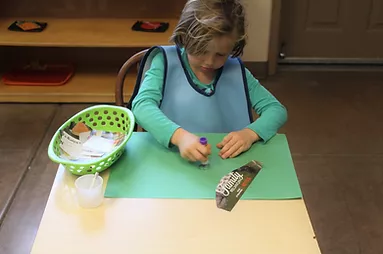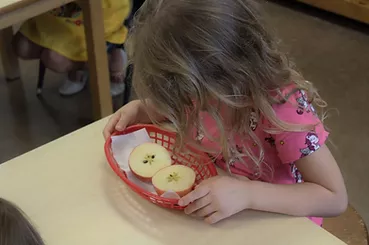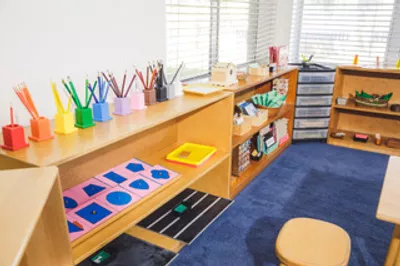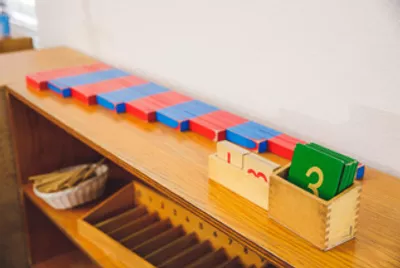Sunrise Montessori SchoolElementaryWe provide education encompassing the social, emotional, intellectual, and physical growth of each child.
Our SchoolThe Montessori Elementary Classroom
At 6, there is a great transformation in the child, like a new birth. The child is no longer interested only in themselves and their family members, but wants to explore society and the world, to learn what is right and wrong, and to explore meaningful roles in society. Although the passing on of the family values and culture begin at birth, it is very important during the years from 6 – 12 (the curious years) that we avoid no topics of conversation, such as sex and drug abuse. We do not want our children to learn about these things from soap operas, TV talk shows, the internet, and misinformed peers. The child of this age wants to know how everything came to be, the history of the universe, the world, humans, and why they behave the way they do. We give them research tools and send them out into the community with purpose. They want to be important, to learn to direct their own life and learning. Given freedom and trust, they will explore, learn, and create in directions we could not have predicted, and accomplish amounts of work we would never have demanded.
The curriculum, for all 6 years, is built around the five great lessons given at the beginning of each year:
- Creation of earth
- Coming of plants and animals
- The arrival of humans
- The arrival of math and language
- Invention
The teacher designs each lesson using stories, music, impressionistic charts, experiments, and games. The idea is always to inspire.
Children following their own interests can quickly surpass the level of any teacher’s expertise.
Elementary children can work together to do research, plan and execute projects, and to share them with other members of the class who are interested. They learn to work in multi-age and multi-ability groups, making use of the interests and abilities of all. This is excellent preparation for adult life in a peaceful society.
From the teacher’s example, the child learns how to teach. This facilitates social development, creativity, and independent thinking. Most important, an environment is provided in which the work and concentration of the individual child is respected. Except for a state required curriculum, lessons in the elementary class are offered, not required. It is the responsibility of the teachers to create lessons that attract the children. If a particular child expresses no interest in a specific lesson, the teacher searches for ways to engage that child. Children learn to plan and to be responsible for their own education. There are certain ages when we have found that children are often interested in a given subject, but the wise adult follows the child, knowing that the human mind works on its own, guided by a power within..
Socialization is at least as important at this level as academics studies. What good is knowledge if not tempered with consideration for others. Peace is not studied as an independent subject, but is part of the daily functioning of the classroom and the natural outcome of an educational method where children are happy with the way they are learning. They learn that peace is not just the absence of war, but the way we treat each other in our daily lives, the way we communicate, and the way we solve problems. Peace begins inside us, at home, at school. Besides setting examples, we can give children ways to practice functioning peacefully by means of manners and community service. The child of 6 to 12 is intensely interested in fairness, and in all kinds of interactions in their group. Because of this, cooperative games provide an important alternative to the feeling of pitting people against each other. They provide practice in working together and in solving problems for the good of all.
The acts of courtesy which he has been taught with a view to his making contacts with others must now be brought to a new level. The question of aid to the weak, to the aged, to the sick, now arises. If, up to the preset, it was important not to bump someone in passing, it is now considered more important not to offend that person.
While the younger child seeks comforts, the older child is now eager to encounter challenges. But these challenges must have an aim.
The passage to the second level of education (ages 6 to 12) is the passage from the sensorial, material level to the abstract. A turning toward the intellectual and moral sides of life occurs at the age of seven.
~Maria Montessori




